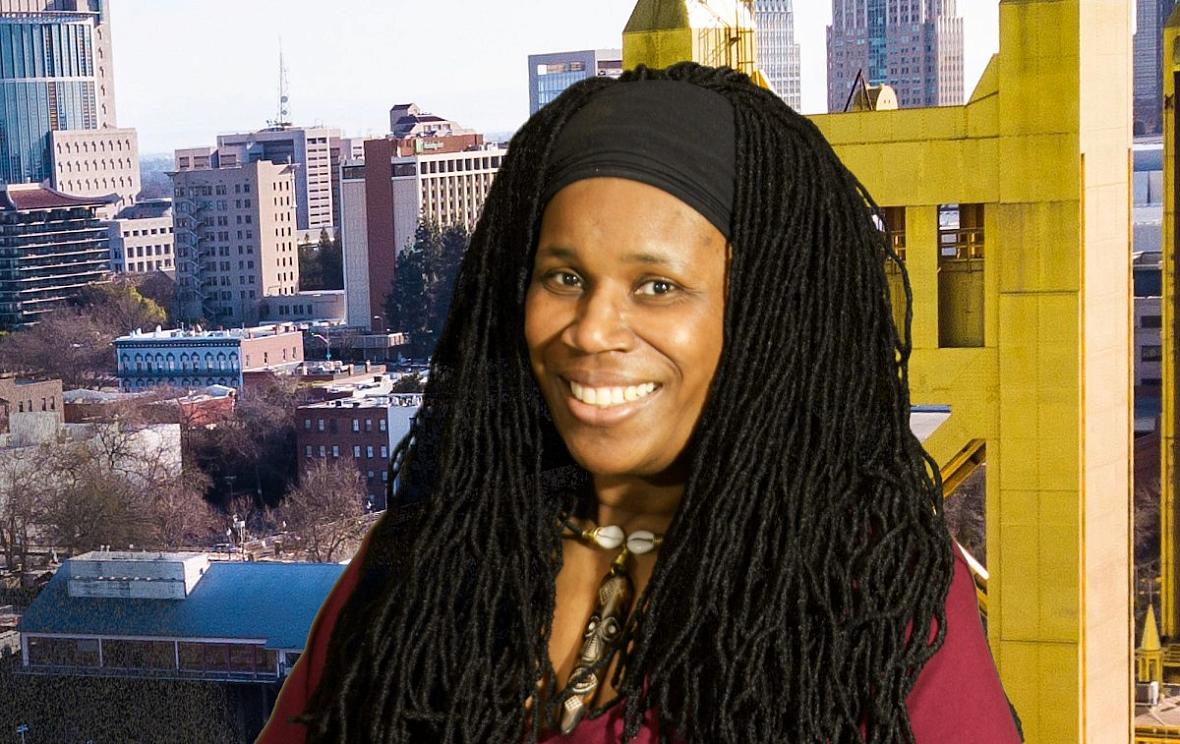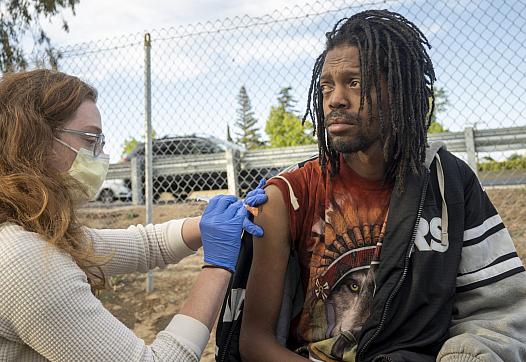How Much More Can We Say It? Get Vaccinated
The story was originally published in The Observer with support from the USC Annenberg Center for Health Journalism's 2021 California Fellowship.

OPINION – A person would be considered “a cold piece” to kill someone and then stand with the person’s family, praying and offering up their condolences.
I’m starting to wonder if we’re not doing essentially the same thing with the coronavirus, killing each other and soothing ourselves with platitudes.
African Americans have been disproportionately affected by COVID-19 since the beginning. Thanks to my continued reporting on the pandemic, I can quote data all day, but should I really have to when those numbers represent someone you live or work with? We are nearly two years into the pandemic and it’s pretty hard not to know — or know of — someone who has gotten sick, or even died.
The realities of the continued coronavirus have hit close to home far too frequently of late.
The sibling of a former colleague whom I hold in high regard. The elderly mother of a college friend who I refer to as a “play cousin.” The sister of my daughter’s sisters, who she never truly got to know. A local literacy champion, community advocate and entrepreneur who encouraged me to complete my first book on absentee fathers because it could bring about healing.
All gone from this earth.
I’m numb. My heart hurts and I’m angry.
For some reason, the severity of the virus just isn’t sinking in. I heard public health officials repeatedly say “avoid large gatherings outside your immediate household.” We didn’t. I heard officials say “wear a mask when you’re around other people.” We don’t always.
The percentage of Black people in Sacramento County who had gotten COVID-19 doubled in the 30 days following the state’s reopening on June 15. The number of reported cases stood at 11,577 as of August 30. The County places the number of local Black deaths at 214.
What will it take to convince us that we have to move differently? How can we create better opportunities for our community when we’re laid up in bed or out of commission while self quarantining due to possible exposure? How can we give our kids better lives or enjoy the fruits of our own labor if we’re dead?
We pray for strength as illness racks our loved ones’ bodies. We pray that frontline health care providers stay well. We take to our social groups and social media platforms, calling on our prayer warriors when someone is hospitalized from this.
We pray, we pray, we pray. I believe in the Almighty, Lord knows I do, and I know that prayer has the power to change things, but we must also put prayer into action.
Public health officials have touted the importance and relative safety of the vaccine since it became available late last year. Yet, many Black folks remain unvaccinated. Some have gotten the shot after the elimination of barriers such as a lack of transportation and clinics being held during weekday work hours. For some, hesitancy stems from historic mistrust, and no amount of convincing will get them to drink the proverbial Kool-Aid.
I have been fully vaccinated. The decision to get the two shots back in May was not one I made lightly. I had mixed feelings right up until the very moment a Kaiser South Sacramento nurse with an extremely soft touch assuaged my anxiety. Truthfully, the second dose of the Pfizer vaccine laid a sistah out and had me questioning everything. I was hot and cold simultaneously and couldn’t move for two days straight, but I imagine getting COVID-19 would have been far worse, especially given the fact that I’m diabetic.
I recently talked to a Black Republican and dare I say it, we agreed that it’s a matter of personal choice and free will.
If you don’t want to get the COVID-19 vaccine, for whatever reason, that’s your personal choice. What you do in your own personal space is your business, but you don’t live in a bubble and when you interfere with my right and ability to be well and exist in my own personal space, I have a real problem with that.
If you don’t want the vaccine, that’s fine, but why not take the recommended precautions if it saves lives? Do your own research, ask questions.
This affects all of us.
A teacher who lowers a mask to read a book to students runs the risk of infecting children, who go home and infect the adults who care for them at home. A resident who walks into a common laundry area and coughs without covering his mouth runs the risk of infecting neighbors who go back to their own apartments and infect their families.
I have kept a low profile during the pandemic. With Type 2 diabetes that I’ve struggled to manage, I’m more susceptible to getting COVID-19 and having harsher symptoms. When asked where I’ve been, I answer truthfully. I’m trying to stay two steps ahead of Rona and her homegirl Delta.
The pandemic has changed everything, but we’re still here. Now, as new cases surge, we have to remain vigilant as we have in other aspects of our lives.
Even during the height of the pandemic’s deadly “first wave,” the Black community took to the streets after the deaths of Breonna Taylor and George Floyd at the hands of law enforcement. It was equally scary and beautiful to see masses of Black people in close proximity, standing together around the world to say, “enough is enough” and “you will no longer kill us and get away with it.”
Just as we seek to tear down structural racism and hold systems, and their agents, accountable, we must keep that same energy with COVID-19.
Droplets don’t wear body cams, but we know they’re to blame. We’re seeing the outcomes with our own eyes.
We’re having to find homes for children who are left behind. We’re creating GoFundMe campaigns instead of car washes for funeral expenses. We’re attending virtual memorials or wearing custom R.I.P. shirts at in-person services kept small due to the need for social distancing.
In recent weeks, I have sent countless prayers up for people who have gotten COVID-19. I have also volunteered to create funeral programs and write obituaries to take a load off of grieving families. Sometimes I don’t know what to do, other than do.
I am encouraged by members of the community who have stepped up during the pandemic to help others. I recently completed a series of articles on vaccine equity, or the lack thereof in the local Black community. Here in the pages of the OBSERVER, I highlighted community-driven efforts to ensure that, if nothing else, we have access to the vaccine. During the course of my reporting, I came across brilliant Black doctors, health activists really, who are working on the frontlines, administering shots and often battling misinformation and bureaucracy in order to do so.
We encourage Black youth to go into the medical profession, seeing it as both a noble and profitable field, yet when we have competent professionals who say “trust the science,” we ignore them and accuse them of being a part of government conspiracies.
I’ve also highlighted efforts of community leaders who are demanding that federal and state monies be directed at the hardest hit, as they were intended. We must support their efforts to support us during these challenging times.
In the face of seemingly insurmountable odds, we’ve risen up in the past and changed the trajectory of our own lives and that of generations to come.
After dealing with a year no one saw coming, the OBSERVER named the community as its “Person Of The Year” for 2020.
We are a resilient people. We’ve gone through more than our fair share of trauma, trials and tribulations. I’m over the “this too shall pass” mentality quite frankly. Historically, we don’t go down without a fight. We’re up against the ropes, ya’ll. We need to channel our inner Muhammad Ali, or better yet, Mike Tyson when he was knocking out opponents in a mere matter of seconds.
Something has to give. So far, it’s been us.


